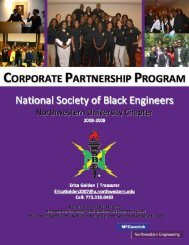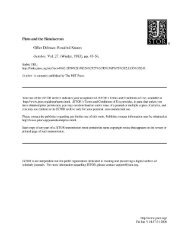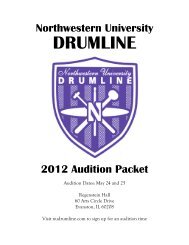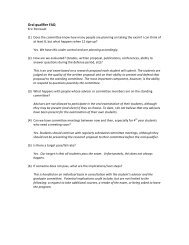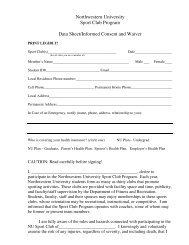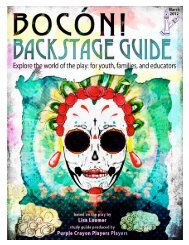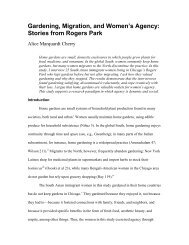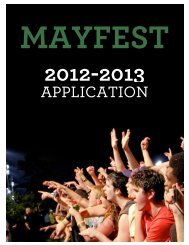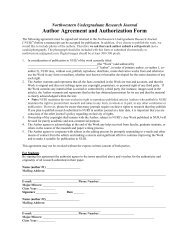research - Associated Student Government, Northwestern University
research - Associated Student Government, Northwestern University
research - Associated Student Government, Northwestern University
You also want an ePaper? Increase the reach of your titles
YUMPU automatically turns print PDFs into web optimized ePapers that Google loves.
RESEARCHunrest in neighboring countries frequently relocatedto Singapore, seeking refuge with family members andfriends, and would relay them news of violent ethnicconflicts, which would in return spur violence in thestate. 27 Such had occurred after the Malaysian electionsof 1969, when Malays there were allegedly “attacked” by“Chinese groups”, resulting in “‘a violent anti-Chinese’reaction and several deaths”. 28 After members of the MalaysianChinese fled to Singapore, they recounted storiesof brutalities the Malays inflicted upon their communities,which spurred violence against the minority Malaycommunity in Singapore. 29 Because members of theSingaporean armed forces were biased towards theirrespective ethnic communities, law and order becomedifficult, creating a chaotic and hostile atmosphere. 30In addition to communal unrest, Lee believed communismwould continue to threaten newly independentSingapore. Though not as serious as the communalism,communist groups had started challenging the establishmentduring the colonial period and had not subsidedafter independence. 31 The communists, particularlyfrom mainland China, had cultural or familial ties to theChinese in Singapore and, thus, had a network of individualsfrom which to recruit new members to carry outcommunist activities such as conducting demonstrationsagainst the government, hampering Lee’s ability to rule. 32Moreover, Lee also noticed that Singapore sufferedfrom a continued lack of economic development afterindependence; it had “less than 100 million [dollars]in the kitty”. 33 Indeed, it had neither directly benefitedfrom international trade that occurred on the islandduring the colonial period nor profited economicallyfrom their participation in the Malaya Federation. 34Furthermore, Singapore was also “faced with a lack ofphysical resources and a small domestic market”, bothof which affected Singapore’s economic growth. 35Given this combination of challenges, Lee experienceda significant psychological and ideological transformation.36 He feared that Singapore may not surviveas it no longer had a foreign power on whom to dependfor support to remedy the various problems in the state:“There is no British army and, much as the Malaysiansthink that they can step in, I think they will find that thisis a real hornet’s nest if they do step in”. 37 According toRandolph Kluver and Ian Webber, “the nation has hadto define its role from a defensive posture”, and aroundthe time of independence Lee had to forgo the goal ofdemocracy in order to pursue authoritarianism, whichwould allow for the rapid creation and implementationof public policies to ensure political order and foster economicdevelopment. 38Using the courts to establishauthoritarianism in SingaporeLee tried to establish his authoritarianism throughthe limitation of public discourse. In order to establishVOLUME 7, 2011-2012the level of conformity needed to ensure the successfuland swift implementation of his public policies, heused libel suits to impose “harsh financial penalties andrestrictions” on his critics, including those in the mediaand in the Parliament. 39 For instance, he sued the Far EastEconomic Review (FEER) and its editor, Derek Davies,for “quoting a renegade priest” that claimed the “governmenthad attacked the Catholic Church” after theyarrested more than seventeen of its members for being“Marxist conspirators”. 40 In his memoirs, Lee maintainsthe courts fined both FEER and Davies for their transgressionsas they had meddled in “Singapore’s domesticaffairs”. 41 Furthermore, he also filed two major libel suitsagainst opposition member, J.B. Jeyaretnam, in the spanof two decades; the first, to punish Jeyaretnam for callingLee “unfit to be prime minister” and, the second, for suggestingthat he had encouraged a government ministerto commit suicide. 42 Both criticisms, he maintains, couldhave hurt his credibility as a leader, and in return convincedsome Singaporeans not to cooperate with his policies.43 Indeed, such libel suits had a significant impact ontransitioning Singapore to an authoritarian regime.Support for authoritarianism fromthe Singaporean middle classAuthoritarianism in Singapore has endured forover four decades due to the support it has received fromthe middle class, the reason for which can be attributed tosome of the highly beneficial economic policies the leadersof the ruling party, the People’s Action Party (PAP),which resulted in economic growth. Shortly after independence,they actively tried to persuade multinationalcompanies to use Singapore’s bevy of low-skilled laborer’s“to produce electronics such as tape-recorders, televisions,and computers for export”. 44 Through their effortsthey were able to cut unemployment in half; however,when Singapore faced “stiff [and often debilitating] competition”from other Asian countries, they quickly turnedto creating a “new industrial policy”, which focused ondeveloping high tech, high growth industries such as“computer and computer peripherals, auto parts, andorganic chemicals”. 45 Because the government was ableto generate high profits, they were able to increase wagesfor their employees, which allowed them to have access tobetter housing, education, social status, and ultimately abetter quality of life.Catherine Lim maintains as more and more Singaporeansjoined the middle class over time, they developedan attitude called “moneytheism” or an “attachment toinfluence”. 46 Her assessment is consistent with the resultsof a survey conducted by the Singapore 21 Committeein 1997, in which middle class Singaporeans indicatedthat they equated wealth with success, and 60 percentwould choose higher salaries over career satisfaction. 47Keiko Tamura asserts based on this survey that the “Singaporeandream” is “to obtain the 4Cs: a credit card, clubNORTHWESTERN UNDERGRADUATE RESEARCH JOURNAL11



